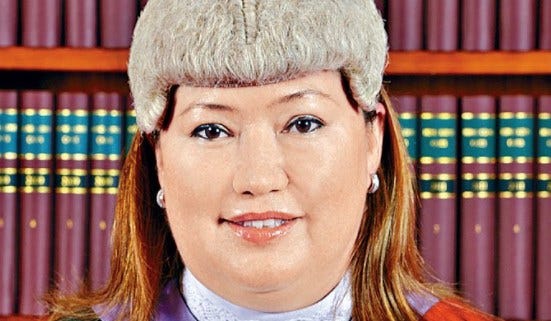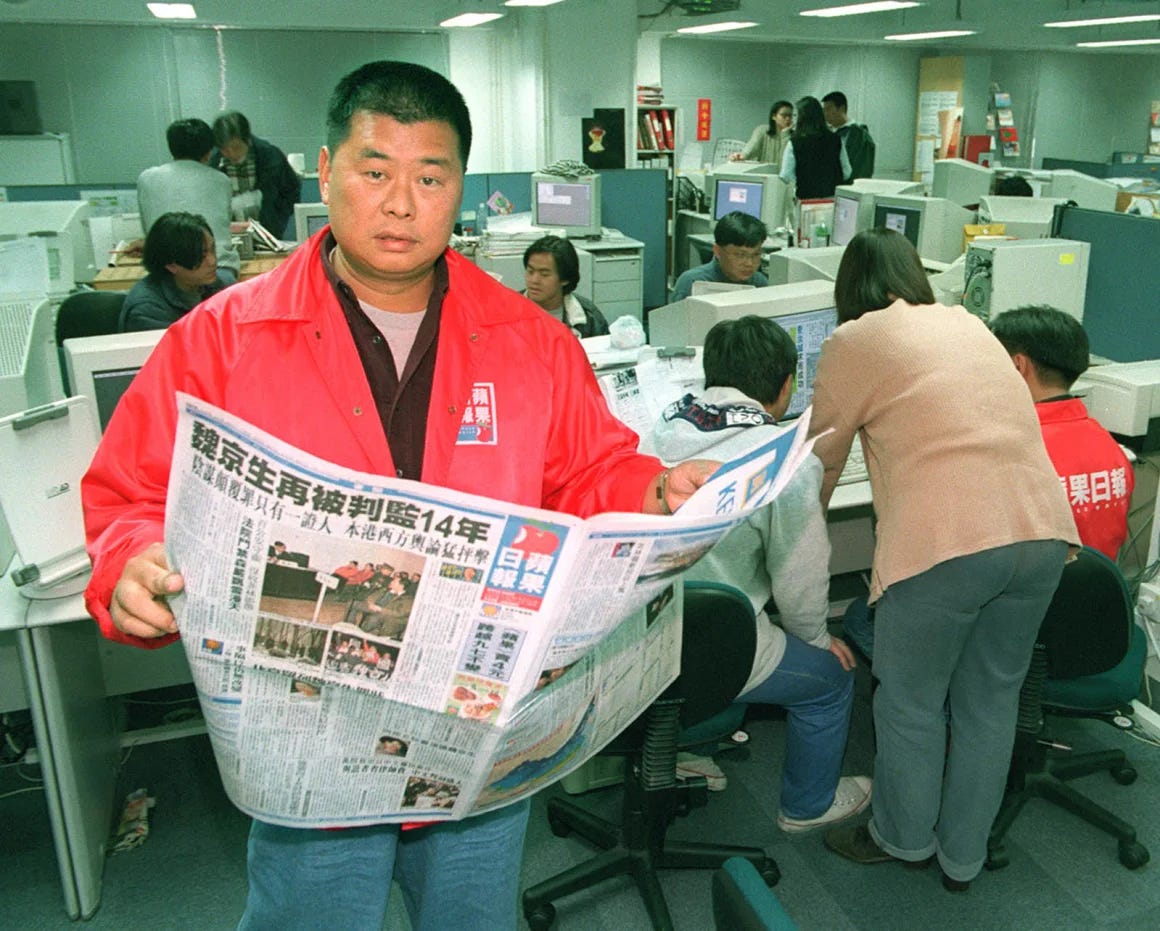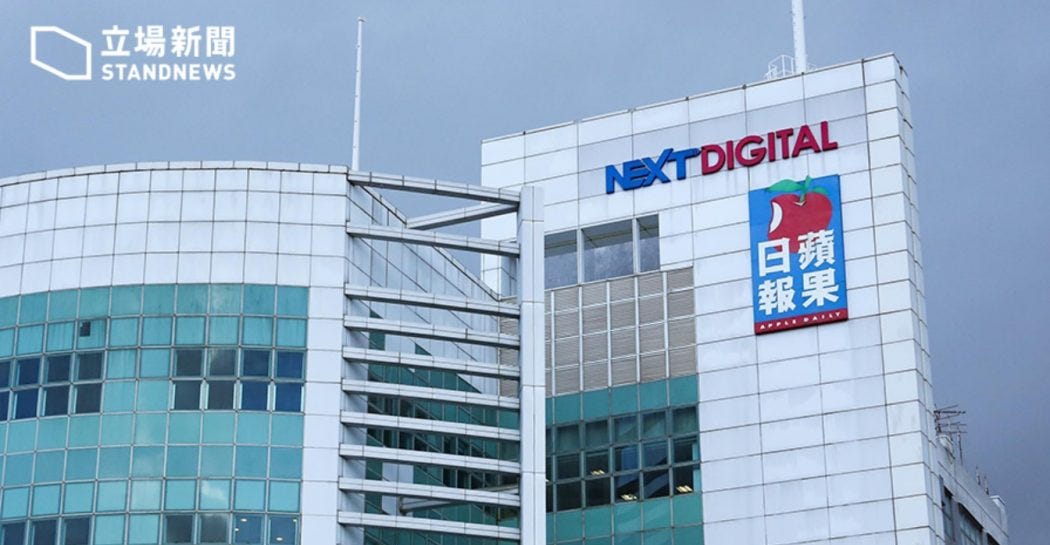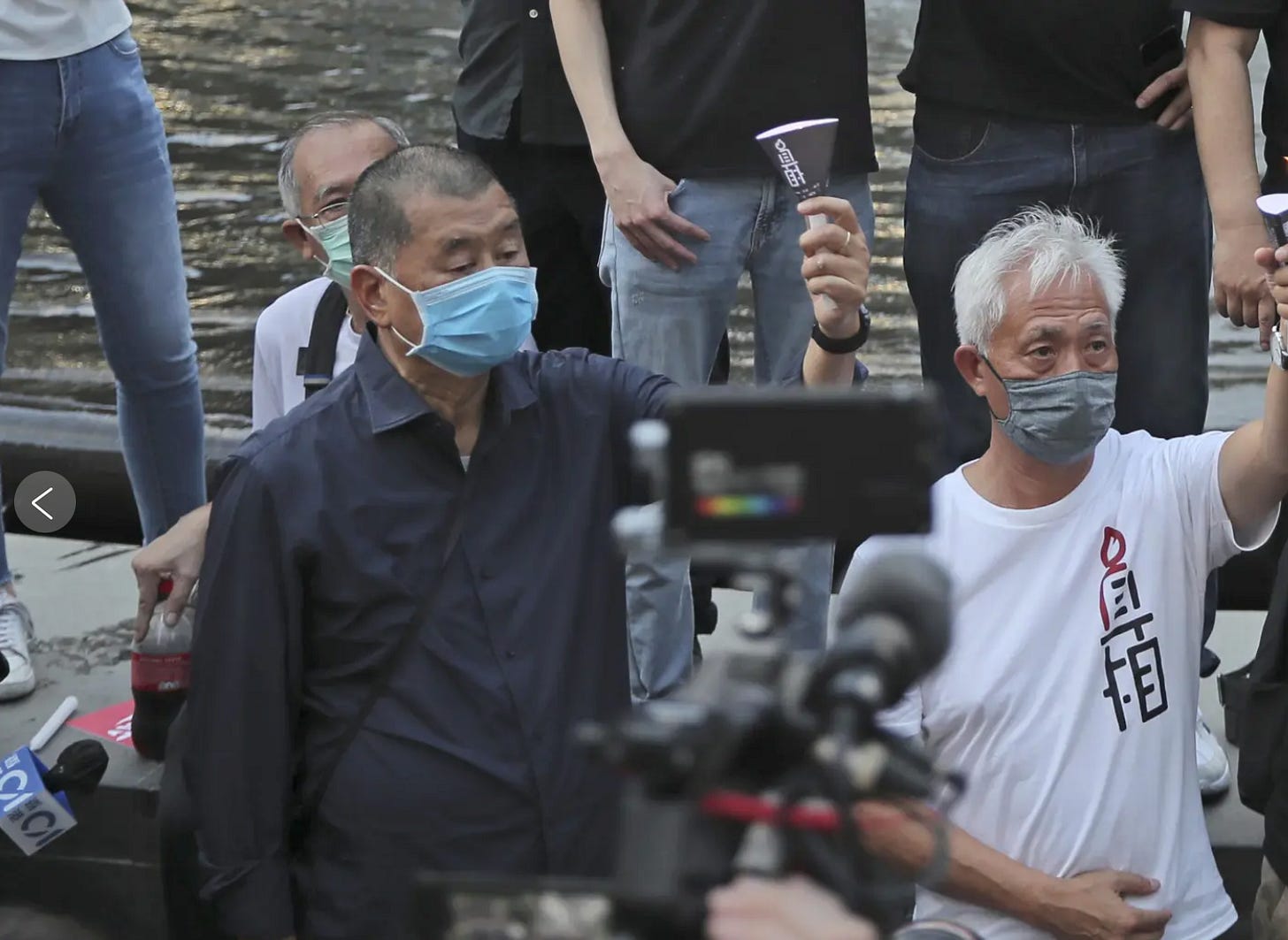The railroading of Jimmy Lai
The media mogul's national security show trial begins on Monday, but it is not his first. Here is a look back at how Hong Kong's judges have kept Lai behind bars for years.
As 2023 wraps up, are you interested in supporting the fight for Hong Kong’s future in 2024? With political prosecutions and a new national security law expected to keep Hong Kong in the conversation next year, we will have opportunities to make genuine, if incremental, progress. I would appreciate if you would consider supporting my U.S. advocacy for Hong Kong, either via a subscription to this Substack or my Patreon. Only do so if you are comfortable with the risks involved. Thank you for your support.
On Monday, Jimmy Lai will be awoken at dawn in his isolated sleeping cell at Hong Kong’s Stanley Prison and marched to the prison’s central administration holding cells. He’ll be handed a lukewarm breakfast of rice, vegetables, and a few slivers of meat, and then handcuffed and marched to a van, where he’ll be driven to the High Court. There, he’ll be placed in another holding cell—just below the international luxury stores in Pacific Place Shopping Centre—and eventually hauled in front of a panel of three national security judges who will finally begin his 80-day trial for “collusion with foreign forces” and sedition.
For 80 days, a pre-ordained theater will unfold in which the Department of Justice will present evidence of Lai’s political connections abroad, and the three complicit judges will ensure the process is smooth for the prosecution and difficult for the defense. When it’s over, Lai will be convicted and sentenced to an obscene prison term—probably for the rest of his life.
How do I know this will be the case? Because while this will be Lai’s biggest trial, it is not his first. Every trial against him has played out in the same way—highly tenuous allegations presented by the DOJ, followed by forced and illogical rulings from judges determined to send Beijing’s most hated Hongkonger back to prison.
Lai has long been the Chinese Communist Party’s prime bogeyman in Hong Kong. Since founding the pro-democracy newspaper Apple Daily in 1994, he has elicited fury from officials on both sides of the border. At least twice, in 2013 and 2019, Chinese state media labeled Lai as a member of a new anti-China “Gang of Four,” and in 2020, Communist Party mouthpiece People’s Daily labeled Lai as “first among the four evils.”
So it was no surprise that when China imposed a repressive National Security Law on Hong Kong on July 1, 2020, Lai was a prime target. Just over a month later, on August 10, Lai was arrested at his home for “collusion with foreign forces,” which had been criminalized by the new law.
On Monday, nearly three and a half years after his arrest and a full three years since he last disappeared behind the walls of Stanley Prison, Lai will finally face trial on those charges, along with additional charges under the British colonial-era sedition law. The trial will be long—it is slated to last for months—and it will be a media circus. Conviction is inevitable. Success for Lai’s sympathizers will be measured by the length of the sentence: anything less than life without parole might be seen as a victory, even if the 70-year-old Lai would be unlikely to see freedom again either way.
Yet, for the CCP’s Enemy Number 1, it was never going to be sufficient for Lai to remain free over the years it took for the Hong Kong DOJ and courts to reach this point. Nor would it even be enough for Lai to be detained on remand, where he would still be imprisoned but would be allowed daily visitors, outside food, and a more relaxed environment.
Instead, over the past several years the DOJ and judiciary worked hand-in-hand to charge, convict, and sentence Lai on a series of increasingly absurd public order and fraud charges. As a result, Lai has been serving time as a convicted prisoner for years.
In this article, I will recap the previous trials that have led up to this week’s climactic national security trial. In some ways, the previous trials are more outrageous even than the national security charges he now faces. While the national security law is offensive and repressive, Hong Kong authorities and judges can at least claim to merely be applying the law as written. But in convicting Lai of a half-dozen non-NSL charges up to this point, they could make no such claim. Instead, judges have bent over backwards to reach convictions on the most tenuous of evidence, then sentenced Lai to prison terms well beyond any semblance of rationality.
There is a persistent misperception among some that the Judiciary is not an active, willing participant in the perversions of law and justice being inflicted on the people of Hong Kong. This claim has been parroted regularly from regime collaborators in the legal community, such as the Hong Kong Bar Association, as well as overseas figures like the Canadian non-permanent justice of the Hong Kong Court of Final Appeal Beverley McLachlin (who collects from the Judiciary about US$51,000 per month in salary along with a Mandarin Oriental suite, and recently insisted the Hong Kong courts that are doing a “terrific job”).

But the contrived convictions against Jimmy Lai expose this lie: Hong Kong’s judges are beyond just passive or even complicit—they are, if not architects, the willing executors of the relentless efforts to dismantle Hong Kong’s democratic opposition.
Timeline of Lai’s Charges and Convictions
Since 2020, Lai has been convicted four times for charges related to organizing, inciting, or participating in an unlawful assembly, and once for fraud related to a lease violation. His upcoming conviction for national security violations will be his sixth and most serious.
Here is a brief timeline of his key arrests, convictions and sentences. (I have left out the many procedural challenges Lai has filed related to choosing his lawyers and protecting his rights as a journalist, among others, but Reuters has a longer timeline for those who are interested.)
First arrest, February 27, 2020 – Lai is arrested on charges of taking part in an unauthorized assembly on August 31, 2019.
July 1, 2020 - Beijing imposes the National Security Law on Hong Kong.
August 10, 2020 – Lai is arrested under the NSL for “collusion with foreign forces.” 200 police raid Apple Daily. He is soon released on police bail.
December 3, 2020 – Lai is arrested and charged with fraud related to the lease on Apple Daily’s headquarters. A magistrate denies bail.
December 11, 2020 – Months after his NSL arrest, Lai is charged with “conspiracy to commit collusion with foreign countries or external elements” under the NSL.
December 23, 2020 – Lai is granted bail again.
December 31, 2020 – In a key case that has led to the pre-trial lockup of dozens of NSL and sedition defendants, the Court of Final Appeal overturns Lai’s grant of bail and sends him back to pre-trial detention. Lai has been in prison continuously since this date three years ago.
April 1, 2021 – Lai is convicted of organizing and taking part in an unauthorized assembly on August 18, 2019, when an estimated 1.7 million people marched against the government.
April 16, 2021 – Lai is sentenced to a combined 14 months in prison for the August 18 and 31 protests. Lai was already remanded to prison, but this is his first prison sentence. As a convicted prisoner he would immediately be moved to a stricter routine and stripped of privileges, such as daily visitation and outside food.
May 28, 2021 –Lai is sentenced to another 14 months for taking part in an unauthorized assembly on October 1, 2019.
December 9, 2021 – Lai is convicted at trial for “incitement to unlawful assembly” for a banned candlelight vigil for Tiananmen Square victims on June 4, 2020.
December 13, 2021 – Lai is sentenced to 13 months for the “incitement to unlawful assembly” conviction.
December 28, 2021 – After the Court of Final Appeal paved the way for colonial sedition offenses to be tried under the rigged national security system, prosecutors add a “seditious publications” charge to Lai’s national security case.
October 25, 2022 –Lai is convicted of fraud for what amounted to a lease violation at Apple Daily’s headquarters. Lai had conducted business for his family office out of the headquarters.
December 10, 2022 – Lai is sentenced to 5 years and 9 months in prison for the lease violation “fraud.”
December 18, 2023 – National security and sedition trial finally slated to begin.
The three convictions for 2019 “unauthorized assemblies”: Egregious sentences for peaceful political expression
During the huge anti-extradition protests that swept Hong Kong in the second half of 2019, Lai was a prominent supporter of the movement. He was a proponent of peaceful demonstration, not violence, and was often seen marching at the front of the million-strong demonstrations over the summer.
But for the government, even these peaceful demonstrations were too much. Soon, the police began banning all demonstrations and marches. Anyone caught gathering peacefully without police authorization could be charged with the crime of “unauthorized assembly.”
This blanket ban violated Hongkongers’ constitutional right to protest under the Basic Law. As such, activists continued to gather and demonstrate. Unsurprisingly, the police escalated their actions in response, which led to further deterioration as peaceful protest leaders like Lai lost control of the situation and skirmishes between police and protesters increased.
In 2020, Lai was ultimately arrested for his role in three of these protests held on August 18, August 31, and October 1, 2019. In none of the three cases was Lai accused of inciting any violence, or of doing anything other than encouraging peaceful political protest.

In April and May, 2021, Judge Amanda Woodcock sentenced Lai to 14 months imprisonment for the August protest, and another 14 months for the October protest.
In each of these cases, the sentences against Lai and his fellow activists were unprecedented in their severity and disproportionality. In comparison, when student leaders Joshua Wong, Nathan Law, and Alex Chow were convicted of unlawful assembly for their organizing role in the 2014 pro-democracy protests, they were initially sentenced to community service. When the DOJ appealed, they were sentenced to 6-8 months in prison—sentences that were considered exceptionally severe at the time.
These first sentences against Lai and his co-defendants were a major departure from the restrained, precedent-based principles that had governed Hong Kong’s judiciary in the past. They signaled a new willingness of judges to consider political issues well beyond the four corners of the case at hand—in this case, the longstanding hatred Beijing held for Jimmy Lai and the need to keep him quiet behind bars.
The Tiananmen Vigil conviction: “Incitement” by lighting a candle

But none of these three cases could match the absurdity of Judge Woodcock’s fourth and final unauthorized assembly conviction against Lai. In December 2021, Woodcock convicted Lai, along with activists Chow Hang Tung and Gwyneth Ho, for “inciting” an unlawful assembly—the June 4, 2020 iteration of the annual Victoria Park candlelight vigil for Tiananmen Square victims, for which Lai was sentenced to 13 months in prison.
I wrote about this conviction at the time (it was my debut article for this Substack). Woodcock’s written ruling in the case detailed the “incitement” for which Lai was supposedly responsible. By the judge’s own account, on June 4, another activist, Lee Cheuk-Yan, held a press conference near (but not in) the park. Lai attended the press conference. At one point, he lit a candle. Then, according to Woodcock, Lai left.
Throughout the event, Lai didn’t say a word. He simply stood there with a candle. He didn’t even enter the park that day. This, according to Judge Woodcock, was enough to convict Lai of inciting others to attend an unlawful assembly.
Woodcock wrote that because Lai “is a prominent public figure known to share similar views as the Hong Kong Alliance,” and because he was “surrounded and followed by photographers and reporters,” his very presence constituted incitement. In other words, because Jimmy Lai was famous and known to support democratic political causes, merely appearing in public justified a conviction and 13-month prison sentence for inciting an unlawful assembly.
The ”fraudulent” lease violation
Just under a year later, with Lai’s existing convictions set to expire, the courts struck again, this time upending the law and common sense in an entirely new way. Judge Stanley Chan tried and convicted Lai for fraud. The “fraud” that Lai allegedly committed amounted to, at best, a lease violation.

The allegations involved Lai’s private family office, Dico Consultants, which Lai allegedly ran out of a small portion of the Apple Daily headquarters to manage his personal assets and directorships. Nothing in the allegations suggested the company’s operations were illegal or improper. Rather, the allegation was merely that Apple Daily’s lease did not allow for its offices to be used for non-journalism purposes.
In normal circumstances, this would have amounted to a contract dispute at most—a civil dispute to be resolved via a damages claim or an eviction. But because Jimmy Lai was involved, the DOJ and Courts decided to use it to continue their pile-on of criminal charges.
As for the sentence, Chan decided the appropriate prison term for this lease violation was an astounding five years and nine months. Just as his previous sentences were set to wrap up, Lai was conveniently slapped with a new one that, despite its patent absurdity, would ensure his imprisonment well past the date of his national security trial.
The beginning of the end: The national security trial
All of this has led up to the trial that begins on Monday.
Lai has now been in prison for three years without bail, all on false charges and convictions enabled by corrupt judges. Since Lai has been barred from having a jury trial, the case will be heard by three handpicked national security judges, all of whom have a long track record of manipulating cases to suit Beijing’s goals—Esther Toh, Susana Maria D’Alamada Remedios, and Alex Lee.
There will be a great deal of theatrics over the coming months to give the appearance of a trial and due process. Witness after witness, document after document, will attest to Lai’s many friends abroad and how they supported his advocacy for democracy.
But make no mistake: As with Lai’s earlier trials, the verdict has already been reached. No matter how absurd the allegations, or how weak the evidence, Lai will be convicted, and he will be handed a ruthlessly long sentence.
As this show trial plays itself out, the world would be wise to avoid giving it legitimacy. The supposed evidence and proceedings are ultimately irrelevant to the outcome. Instead, the media should frame this trial for what it is: a propaganda set piece, designed by Beijing and implemented faithfully by Hong Kong’s “independent” judges.
Let’s focus instead on the real story: How one tycoon, who could have walked away with his millions, instead chose to sacrifice everything for the sake of the city he loves.







